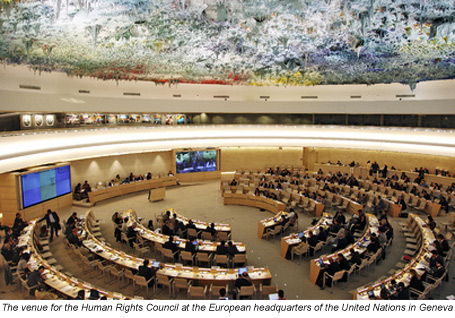Eighty-four countries signed a statement entitled “Ending Acts of Violence and Related Human Rights Violations Based on Sexual Orientation and Gender Identity” on Tuesday calling for an end to violence, criminal sanctions and other human rights violations against people based on their sexual orientation or gender identity.
The statement expresses “concern at continued evidence in every region of acts of violence and related human rights violations based on sexual orientation and gender identity” and calls on countries “to take steps to end acts of violence, criminal sanctions and related human rights violations committed against individuals because of their sexual orientation or gender identity.”
According to the International Lesbian, Gay, Bisexual, Trans, and Intersex Association (ILGA), 76 countries, including 19 of 48 countries in the Asia Pacific region, criminalise male-to-male sex. Eight countries – Iran, Mauritania, Saudi Arabia, Sudan, UAE and Yemen [plus some parts of Nigeria and Somalia] – prescribe death as punishment.
The declaration, which was heavily supported by the Obama Administration, has been praised by international LGBTI groups who point out growing support among UN member nations.
"It is clear that every time these issues are addressed there is measurable increase in state support," said a joint press statement issued by the International Gay & Lesbian Human Rights Commission (ILGHRC) in association with Amnesty International, Human Rights Watch, Thailand's Sexual Diversity Network and seven other LGBT rights groups on March 23.
It noted that the statement, which was delivered by the representative of Colombia on behalf of 84 countries at the United Nations Human Rights Council (UNHRC) in Geneva enjoyed the support of the largest group of countries to-date, on the topic of sexual orientation, gender identity and human rights. It builds on a similar statement delivered by Norway at the Human Rights Council in 2006 (on behalf of 54 States), and a joint statement delivered by Argentina at the General Assembly in 2008 (on behalf of 66 States). The new resolution now has support from Thailand, Rwanda, El Salvador, Honduras, and the Dominican Republic, which did not support the 2008 document.
The Obama administration's expression of support for U.N. action on the issue also marks a reversal from years of ambiguity on the subject during the presidency of George W. Bush.
A resolution could be brought to a vote later this year.
The signatories to the joint statement are: Albania, Andorra, Argentina, Armenia, Australia, Austria, Belgium, Bolivia, Bosnia, Brazil, Bulgaria, Canada, the Central African Republic, Chile, Costa Rica, Croatia, Cuba, Cyprus, the Czech Republic, Denmark, Dominica, Dominican Republic, Ecuador, El Salvador, Estonia, Fiji, Finland, France, Georgia, Germany, Greece, Guatemala, Honduras, Hungary, Iceland, Ireland, Israel, Italy, Japan, Latvia, Lichtenstein, Lithuania, Luxembourg, the former-Yugoslav Republic of Macedonia, Malta, the Marshall Islands, Mexico, Micronesia, Monaco, Mongolia, Montenegro, Nauru, Nepal, Netherlands, New Zealand, Nicaragua, Norway, Palau, Panama, Paraguay, Poland, Portugal, Romania, Rwanda, Samoa, San Marino, Serbia, Seychelles, Sierra Leone, Slovakia, Slovenia, South Africa, Spain, Sweden, Switzerland, Thailand, Timor-Leste, Tuvalu, the United States of America, the United Kingdom of Great Britain and Northern Ireland, Ukraine, Uruguay, Vanautu and Venezuela.

